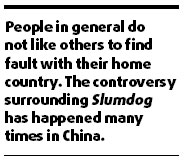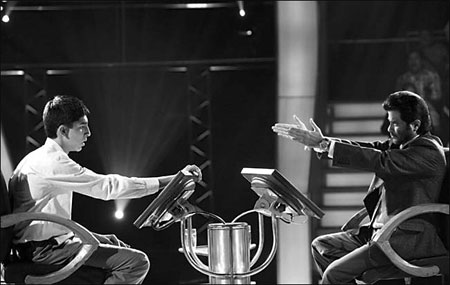Slumdog wags its tale
By Raymond Zhou ( China Daily ) Updated: 2009-02-23 18:09:29Detractors of the third installment of Mummy were annoyed that the arch villain was a thinly veiled portrait of the First Emperor Qin (Qinshihuang). But Qin has never been loved in China. Still, emotions were hurt, genuine or exaggerated.
I bet, if Slumdog were made by filmmakers from a country less culturally influential than the United Kingdom, reactions from India would be more subdued. Unbeknownst to globe-trotting filmmakers, the setting of the story could set off politically charged repercussions. Simply put, people don't like big guys to tell them they are not good enough. It's an issue of self-regard, and it is a notion more rampant in Asia.

Accuracy is relative. A fantasy is by definition not realistically accurate. What really matters is the presence of malice. I didn't detect anything remotely malignant in Slumdog. Subtler still is condescension, which may permeate a work of art or entertainment made by the powerful outsider. When Hollywood tackles a third-world subject matter, it is sometimes soaked in a kind of humanitarianism that borders on pity. But that's a murky territory because each filmgoer may read different things into it and come out with different conclusions.
The outside perspective has certain advantages. It's fresh and full of curiosity. It can discover beauty that locals take for granted. It is also characterized by less patience with social ills that locals are numb to. We may hate it when others pinpoint our scars, but from my observation, outsiders can better identify our strengths than our weaknesses. When it comes to criticism, locals have the incisive perspective that outsiders rarely possess.
Pop culture seldom ventures this deep. It's all about facade. Slumdog Millionaire does not explain how that mammoth slum came into being and what kind of people inhabit it. It presents saturated facets of it, and it is suffused with so much exuberance it almost celebrates it. The real problem with the movie is not the squalor or the destitution, but the love story and the protagonist's personality, which are so trite and formulaic as to rival any Hollywood or Bollywood production rolling down the assembly line, or shall we say, swept from the cutting floor.
 |
| Jamal Malik (left) in the show "Who Wants to Be a Millionaire?". |
This is a movie that excites the senses, but leaves nothing cerebral. It is an old tale told in a most unusual way. What if it has the adolescents speak English where Hindi is appropriate? Details like that indeed upset local audiences who can easily detect any discrepancy with reality. Chow Yun-Fat and Michelle Yeoh spoke Mandarin with an awkward tentativeness that made Beijing moviegoers squirm, but these quibbles alone would not make or break a movie.
The real value of Slumdog lies in its interaction between the East and the West. It's an embrace of Hollywood and Bollywood. It testifies to the potential appeal of Asian subject matters on the global screen. This is not the best Indian movie I've seen - if it can be categorized as Indian. The Apu trilogy is far superior artistically. But it is a movie many outside India can relate to in more ways than one. Oscar or not, it is worth seeing.
|
|
|
|
|
|
|
|


























 Raymond Zhou:
Raymond Zhou: Pauline D Loh:
Pauline D Loh: Hot Pot
Hot Pot Eco China
Eco China China Dream
China Dream China Face
China Face






